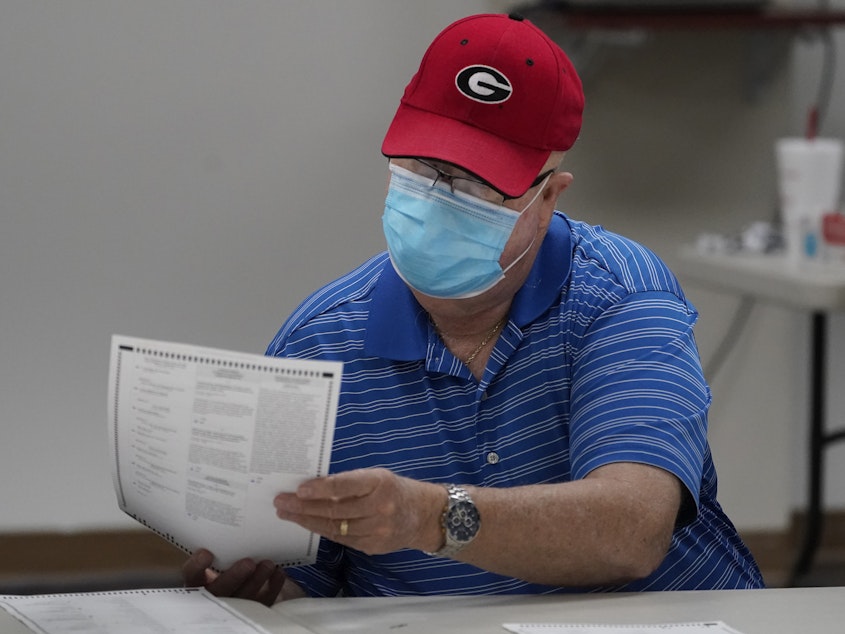Hand-counting ballots may sound nice. It's actually less accurate and more expensive

Many Americans are unfamiliar with how elections are run. And in recent years, purveyors of false claims have taken advantage of that lack of knowledge to sow doubts about certain aspects of the voting process.
In response, NPR's voting team is offering a series of explainers on some of these election topics. This is the second. You can find all of our stories here.
It's a common refrain from election deniers and the Republicans who support them this election cycle: Get rid of the machines.
According to many conspiracy theorists, the 2020 election was stolen by an algorithm, therefore if you take computers out of the voting process you can further secure your election.
At a county commission meeting in Nevada's Nye County this past March, for instance, Jim Marchant, an election denier who is the GOP nominee to be that state's secretary of state, implored local officials to ditch their vote-counting equipment.
"It is imperative that you secure the trust of your constituents in Nye County by ensuring that you have a fair and transparent election and the only way to do that is to not use electronic voting or tabulation machines," he said.
It's a false sentiment that has festered in far-right corners across the country, shepherded by election denial influencers like MyPillow founder Mike Lindell and his acolytes.
In some cases, officials are listening. Nye County is planning to hand-count ballots, alongside machine tabulation, in this November's midterm elections, and another county in Nevada, Esmeralda, spent more than seven hours hand-counting just 317 ballots as part of its certification of this summer's primary election.
Polling also shows that Republicans nationwide have in recent years grown more skeptical of machines helping to tabulate their votes.
In Minnesota, a group has been going county-to-county urging them to ditch their tabulators, according to the Secretary of State Steve Simon.
"No county, thankfully, has gone in for that. But it is a movement and we're keeping our eye on it," Simon, a Democrat, said in an interview with NPR. "It's distressing to see."
What the research has found
Hand-counting ballots is a voting "solution" that, to those without familiarity with elections, may sound nice. The problem is that counting tactic has actually been found to be significantly less accurate, more expensive and more time-consuming than using tabulation equipment.
"Computers — which ballot scanners rely on — are very good at tedious, repetitive tasks. Humans are bad at them," wrote Charles Stewart III, who directs the MIT Election Data and Science Lab, in the Washington Post. "Counting votes is tedious and repetitive."
Stewart coauthored a study in 2018 that found ballot scanners to be more accurate than hand counts. The study focused on two statewide races with recounts in Wisconsin, where some localities do count ballots by hand and others count ballots using machines:
In Wisconsin's 2011 Supreme Court election recount, the hand-counted paper ballots differed from the recount by 0.28 percent while the difference for scanned paper ballots was 0.15 percent. In its 2016 recount of the presidential election, hand-counted paper ballots were off by 0.18 percent while scanned ballots were off by 0.13 percent.
In short, in both races, the ballots that were counted using scanners were closer to the recounted totals. A separate study from the early 2000s focused on New Hampshire and found the same thing.
"All the data shows it is less accurate to do a hand count," says Simon. "What you're really asking beleaguered and tired election judges to do at the end of a very long day is to not just do one hand count; if there are 30 contests on a ballot, you're asking them to do 30 individual and separate hand counts. And people are people. They get tired, they make mistakes. "
Moving back toward hand-counting ballots would also significantly increase costs for local election offices that are perennially under-resourced, says Jennifer Morrell, an elections consultant and former local voting administrator.
The staff size at almost every election office across the country would need to exponentially increase, and even then, hand-counting dozens of races on tens of millions of ballots would probably take weeks or months.
Considering many of the Republicans who are calling for hand counts are the same people who cast doubt on the 2020 election because results weren't finalized on election night, Morrell says it shows they haven't done their research.
"I just think they don't understand what that looks like and how much time that takes and what the process is to do it accurately and correctly," Morrell said. "Or they wouldn't be calling for that." [Copyright 2022 NPR]



